The lives of Valencia’s stray cats are as complex as the people watching them
Passersby come for the shade, the benches and the greenery... but most of them stay for the cats. As the city slowly reopens, Mark Drummon recalls the comings and goings of Neptune Gardens’ biggest personalities
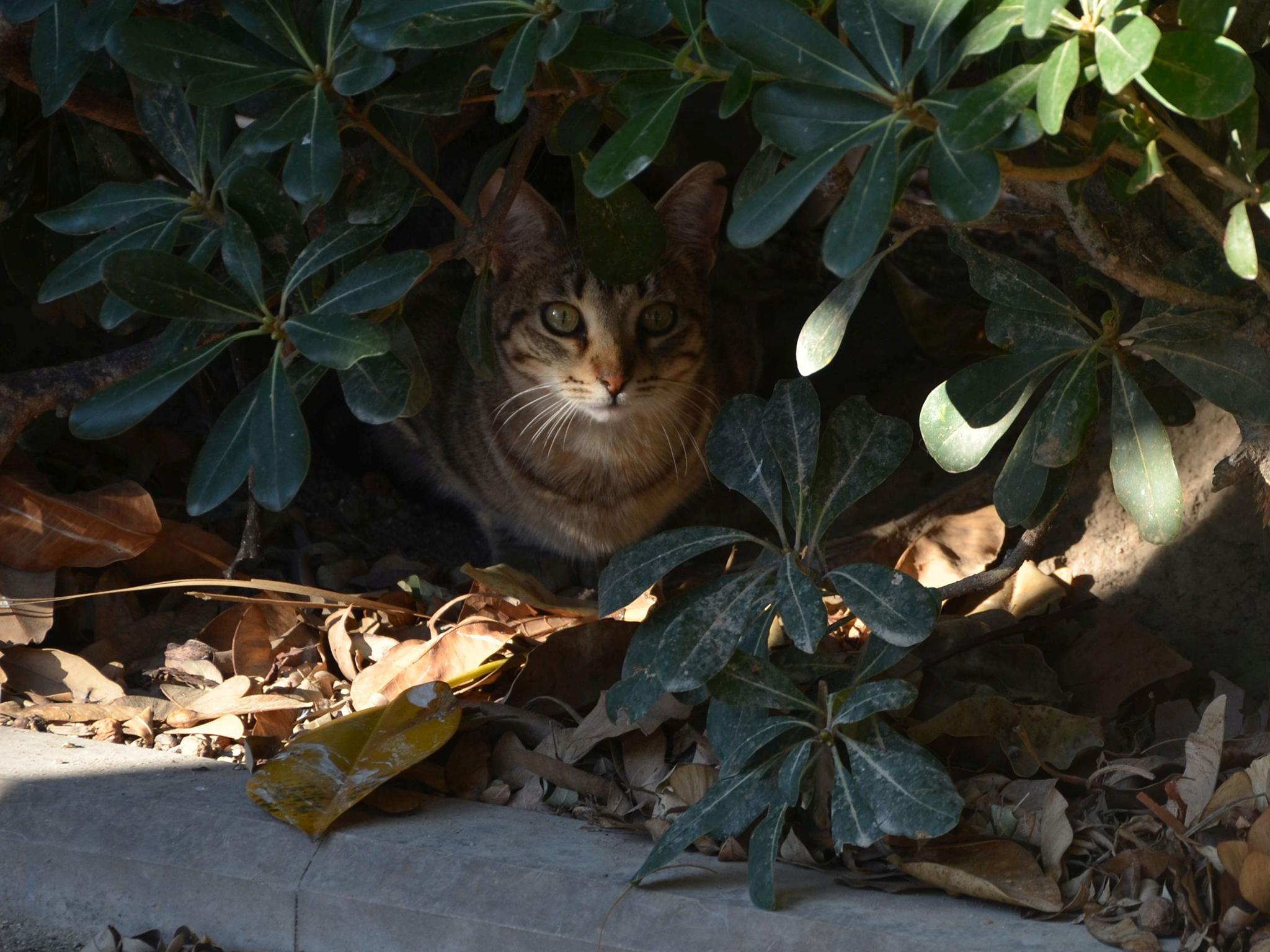
It is high summer and late afternoon, and the locals are mostly napping in the shade. It is siesta time, and only tourists are active in this heat. The Mediterranean sun beats down on two young, freshly tanned, scantily clad holidaymakers as they stroll along the central path of a small park. They pass a middle-aged man sleeping on a bench beneath the canopy of a palm tree. He is shirtless, revealing a flabby milk-white torso that contrasts with his well-tanned forearms; his bald head rests on a battered old backpack. This time every day, he occupies the same spot. And it is a good spot, for this bench is the only one that stays shaded all afternoon. The girls also pass a beautiful cat, one of the park’s permanent residents, pausing briefly to take a photo on their smartphones of it snoozing in the bushes. Princesa, a female with a luxuriant white coat, opens an eye, but refuses the girls’ entreaties to approach them. For in amongst the shrubbery, she too has a nice shaded spot. With one opened eye, the antisocial stray cautiously watches the girls until they continue on their way.
Also watching the girls is a woman who spends her days in the park and her evenings outside supermarkets begging for small change. Reclining on a concrete bench, she’s been drifting in and out of sleep. Diminutive, with curly hair and leathery skin, the lady fidgets, constantly changing her position, unable to get comfortable. She watches the girls awhile, perhaps sympathetically noting that she too can never get Princesa to come to her.
The park lies to the rear of a row of seafront hotels and restaurants along Playa de la Malvarrosa, Valencia’s main beach. It is a verdant oasis amidst a landscape of concrete and sand. The pint-sized public space is surrounded on all four sides by roads, creating a tarmac “moat”. It is home to a diverse, and often eccentric, assortment of life, human and animal, and it is a vital refuge for many. The park is named Jardines de Neptuno. This is its story.
Open house
In Spain, the phrase for stray cats is gatos vagabundos, and they are quite a common sight. Every vacant building or unused plot of land seems to be home to a colony. The number of strays living in Jardines de Neptuno fluctuates, but generally reaches double figures. The park is home to fewer human vagabonds, but as many as half a dozen can be found kipping on the benches or grass during the night. And like parks everywhere, there is a considerable difference in clientele and atmosphere between day and night. During daylight hours, Jardines de Neptuno is largely occupied by the casual visitor – dog walkers, elderly strollers, parents with young children to entertain, book readers, affluent locals passing through on their way to high-end restaurants, holidaymakers en route to the beach, the unemployed with some time to kill, waitresses grabbing a quick smoke and kitchen staff on a coffee break – and you will have to look hard to spot felines sleeping in shaded hedgerows. But once dusk falls, the cats emerge into the cool night air; and as the evening goes on, they are joined by homeless people who during the daytime must ensure they are not seen by the tourists, lest they be moved on by the authorities. Some parks in Valencia have walls, and gates that are locked at night, so this one, without either, is a haven open to all.
A monarch in the grass
Jardines de Neptuno’s most famous inhabitant is Princesa. The beautiful white cat was given her name by park regulars due to her aloof, regal manner, and her good looks. She is a striking girl, almost entirely white, with a few small patches of black at her extremities, her ears and tail, and she has a delicate pink nose. Few strollers in the gardens who notice her fail to pause awhile, marvelling at her beauty, snapping pics, and trying in vain to get her to approach. Her name is apt. She is haughty and bossy, and is the park’s matriarch. And she doesn’t take kindly to unfamiliar feline arrivals. When a peripatetic stray wanders into the gardens she will follow it around, stare it down and intimidate it, until it moves on. She doesn’t fight, but gets her point across without the need for fisticuffs, and sooner or later the stranger leaves, usually with a harassed expression on its face. I watched her once see off a large tomcat with torn ears and scars on his face (I made sure he got a good meal before Princesa ”escorted” him off the premises). I’m certain the battle-hardened nomad could have bested Princesa, but she projected such an aura of confidence and authority that he dared not test her.
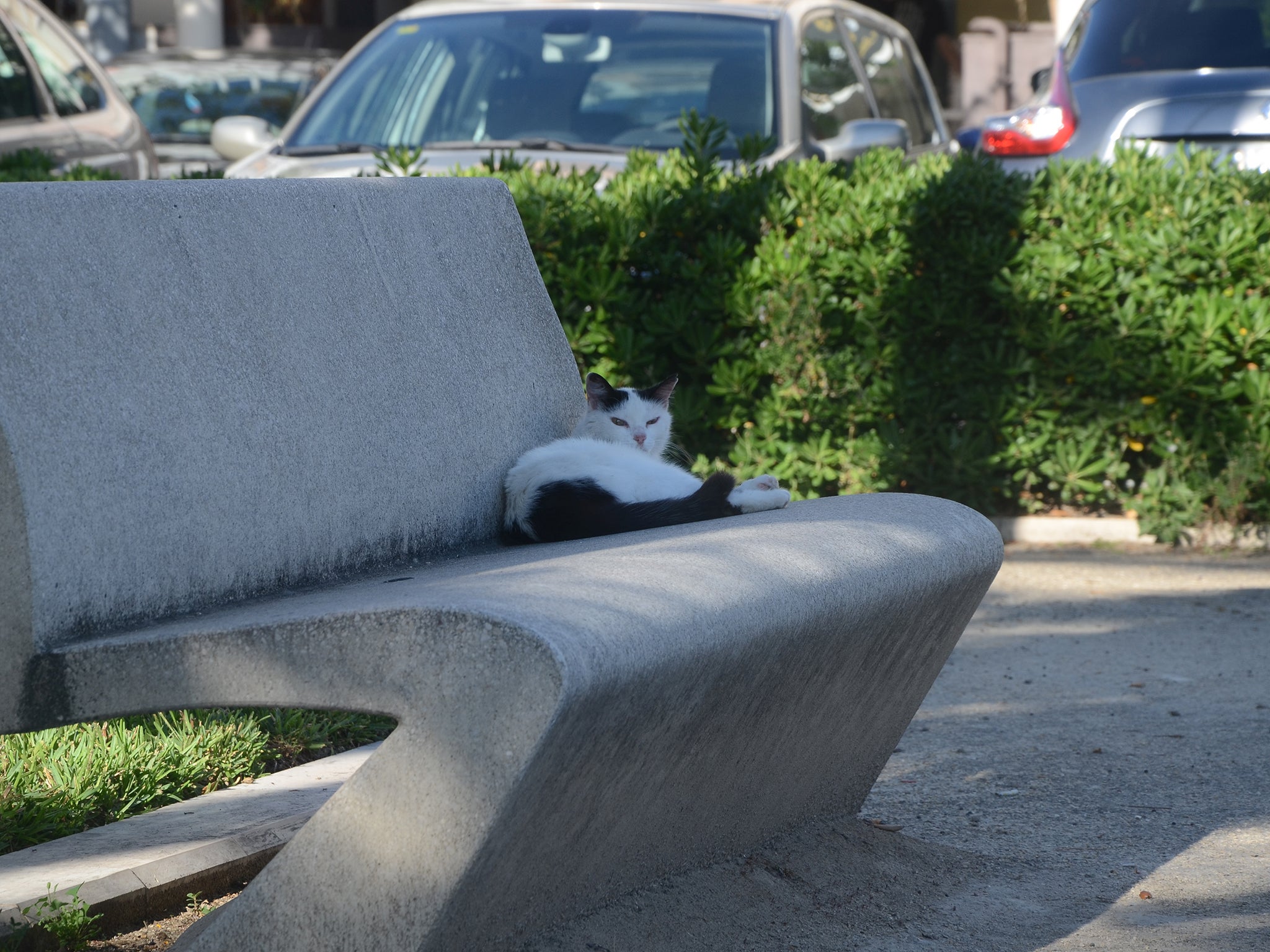
If Princesa is the park’s reigning monarch, it is a throne she inherited from Tuerta, a one-eyed tortoiseshell who had a very different character.
The lady vanishes
The disappearance of Tuerta, the erstwhile queen of the park, remains a mystery. None of her caregivers knows what became of her. One day she was there, saying hello to all and sundry, and the next she was gone. The immediate fear is that she was too trusting of humans. Tuerta never turned down the chance to be stroked, and seldom did the legs of passer-by go unrubbed. However, Tuerta was not so friendly to other cats. She was clearly at the apex of the feline hierarchy, and maintained her position through occasional bouts of violence.
I leave some food for the strays before heading home, fearful that if I loiter for too long the police will appear and fine me for defying the stay-at-home order. The cats sense something is wrong
When Tuerta went missing, Pepe was particularly distraught. He is a chef at one of the restaurants that back onto the park. He is a big, burly man, with tattooed arms and slicked-back hair tied in a ponytail. He looks as though, in another life, he could have been a cage fighter. In this life he is a kind, gentle soul, and one of the cats’ caregivers. And he had a particular bond with Tuerta (it was Pepe who gave the affable tortoiseshell its name, which is Spanish for one-eyed). Even his dog, a rescued corgi, which Pepe takes for walks through the park at regular intervals, was good friends with Tuerta. Pepe still hopes that the one-eyed cat will reappear in the park someday.
A tiger in the bush
Locals call one of the strays Skippy. For reasons I don’t entirely understand, the female tabby has been named after the titular character of an Australian TV series about a bush kangaroo. Skippy the feline looks far more like a miniature tiger than a marsupial (in fact, one of the homeless humans that sleep in the park calls her Tiger). Skippy looks quite young, though her exact age is unknown (the consensus is that she has lived in the park for at least a few years). And she is mischievous. She’ll chase after anything that moves – providing it is smaller than her and not at all scary (Skippy, though playful, is timid). I’ve seen her chase birds, butterflies and grasshoppers. Luckily for the aforementioned, Skippy is no hunter. Her method of stalking involves charging headlong towards her prey the moment she spies it. She is overweight – the result of being fed by so many different caregivers – and not especially mobile. Short legs propel her rotund body towards her target with absolutely no guile and very little speed. She also mews constantly during the process. Prey would have to be on its last legs to be caught by Skippy.
An Englishman abroad
Roberto is one of the park’s two-legged residents. “It’s my casa,” he says. He regularly mixes English and Spanish, especially when he’s been drinking. Roberto is an Englishman who has been in Spain for a long time. So long in fact, and so cut off from anglophones, that Spanish flows more readily from his lips than his mother tongue. His name is actually Robert – the extra syllable added to aid assimilation. He may be half Spanish, or half Polish, but he is certainly English (he has, at different times, claimed to be half of all three). “You sound English,” I told him the first time we met. “I am English,” he replied. He speaks with a northern accent, and says he’s from Leeds. And while his accent is all English, his vocabulary seems to be diminishing. Sometimes he struggles to find words in English that come easily in Spanish.
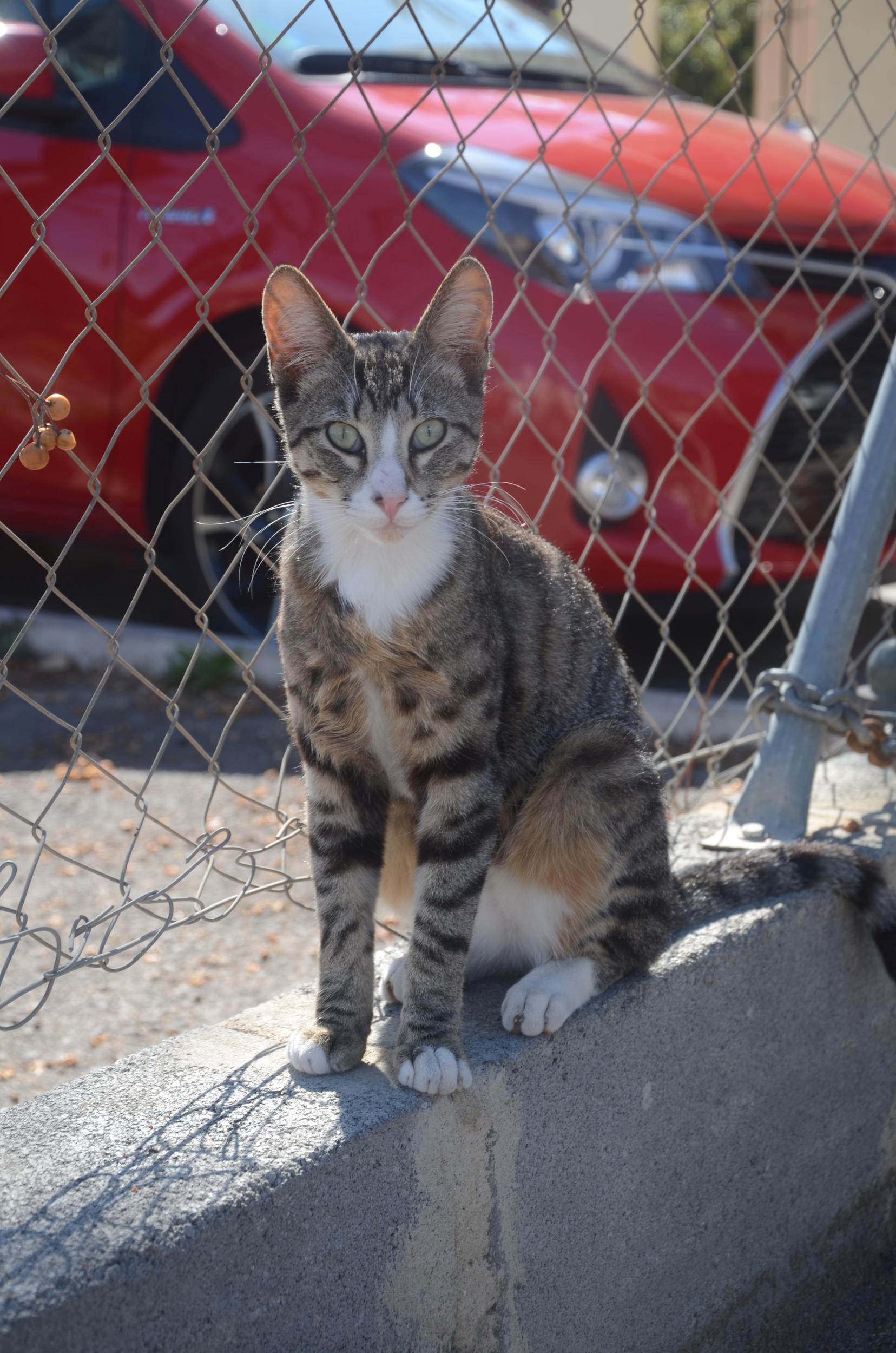
Roberto is on the short side, red-faced, and his weak body shows signs of a long-term drinking problem. His age is difficult to gauge: it is just possible that he is in his late twenties, but he looks much older. Like many of us, Roberto has his demons, but he is warm-hearted. He once told me he loved Skippy, and that on cold nights Princesa seeks him out and curls up next to him. The homeless Brit comes and goes as his precarious life ebbs and flows, and he can be gone for months on end, but I think the reason he keeps returning to this particular park is the cats. They are the reason I keep coming back, too.
A young prince
I first came across Wales when he was very young. Not quite a kitten, but still far from adulthood. He was gangly and boisterous, and often had scratches on his face. Not as the result of fighting, but of squeezing his head and skinny body through holes in wire fences. Back then his ears were not in proportion to the rest of his body. They were as large and prominent as his body was slight. And so I named him after a certain prince. Since then, Wales’ frame has filled out as he matured, and his ears are no longer disproportionate; but the name has stuck.
I’ve watched him grow up at staggered intervals, as I tend only to be in Valencia for short periods a couple of times a year. He is not originally from the park, but from a colony based in a nearby skateboarding facility. The skateboarders are no fans of cats, and periodically drive them away, complaining to those who feed them that the strays are dirty and spread disease. And so that colony has scattered. Wales occasionally pops up in Jardines de Neptuno, looking hungry, and with scratches on his face, this time probably the result of fighting. Life for a wandering tomcat is hard.
Tom the cat
Thomas is another nomadic male. He is quite a large cat, with long legs and an athletic frame, and black and white fur. His size advantage notwithstanding, he is timorous, and easily bullied by smaller cats. He doesn’t seem as smart as his peers, and is awkward, comical even, in the company of both felines and humans. He wants to be affectionate but anxiety prevents him. One time after I’d fed him, he nervously moved in to rub my legs, presumably in appreciation of the meal I’d just given him. But his nerves got the better of him and he half aborted the manoeuvre at the last moment and ended up head-butting my leg, which spooked him, causing him to jump into the air and run to the bushes with a confused look on his face.
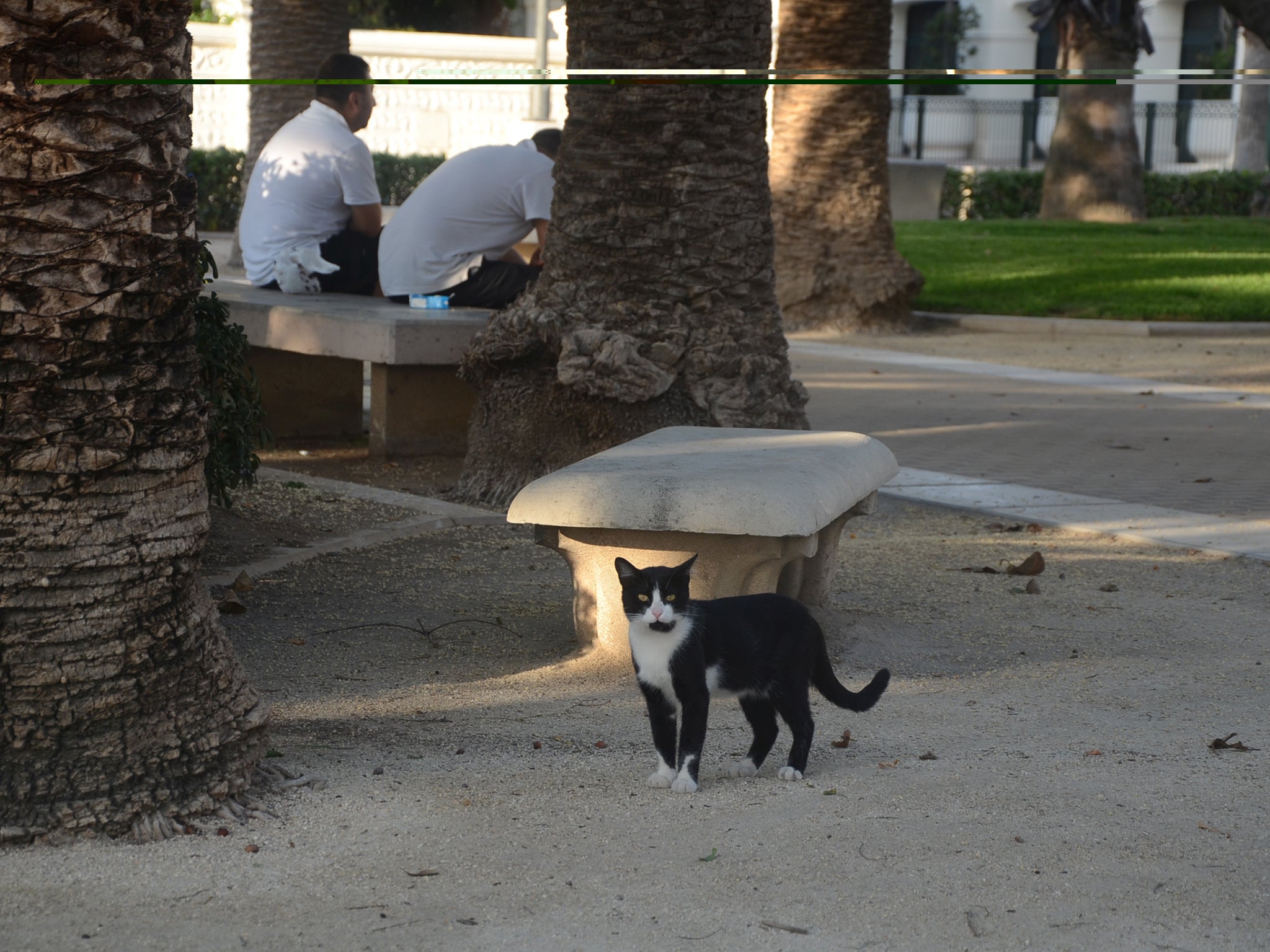
Thomas spent his youth and young adulthood in the gardens, but once he reached a certain age he went off chasing girls. Unfortunately for him, the ladies of the park – Tuerta, Princesa, Skippy – have all been spayed (for a while a local charity would neuter any female stray that could be caught, and clip an ear to show it), so Thomas left his home, and its relative safety and regular food deposits, in search of mates. Like Wales, he visits the park from time to time, battered and bruised and in need of a square meal. He is usually able to fill his stomach before Princesa runs him out of town.
African smiles
It’s a warm, sunny day, and Saul is laying strips of cardboard onto a patch of grass in the park, creating a makeshift bed. He’s getting ready for his afternoon nap. Saul is a park regular. He isn’t exactly homeless and doesn’t sleep here (except during siesta time), but he spends much of his day in or around the park. He works in the adjacent street, directing vehicles to vacant parking spaces for small change. It is hardly an essential service, as drivers could easily park without help, but everyone seems to go along with it, handing over a few coins as they exit their automobiles and head to restaurants or the beach. The car park appears to be divided into four or five sections, each run by a different individual. Saul’s zone is at the beginning of the street.
The first time I noticed Saul, he was sat on a park bench taking questions in English from a pair of American Jehovah’s Witnesses, two attractive blondes in their mid-twenties, who were politely quizzing him on his faith. Saul, a Muslim originally from Guinea, responded in a warm, friendly manner and appeared entirely unoffended. He smiled at me when he noticed that I was observing the exchange from a nearby bench. He smiles a lot and seems to know everybody. “Hola, qué pasa?” he says, with a grin on his face, to pretty much everyone he meets. If Princesa is queen of the park, then Saul is prince of the street.
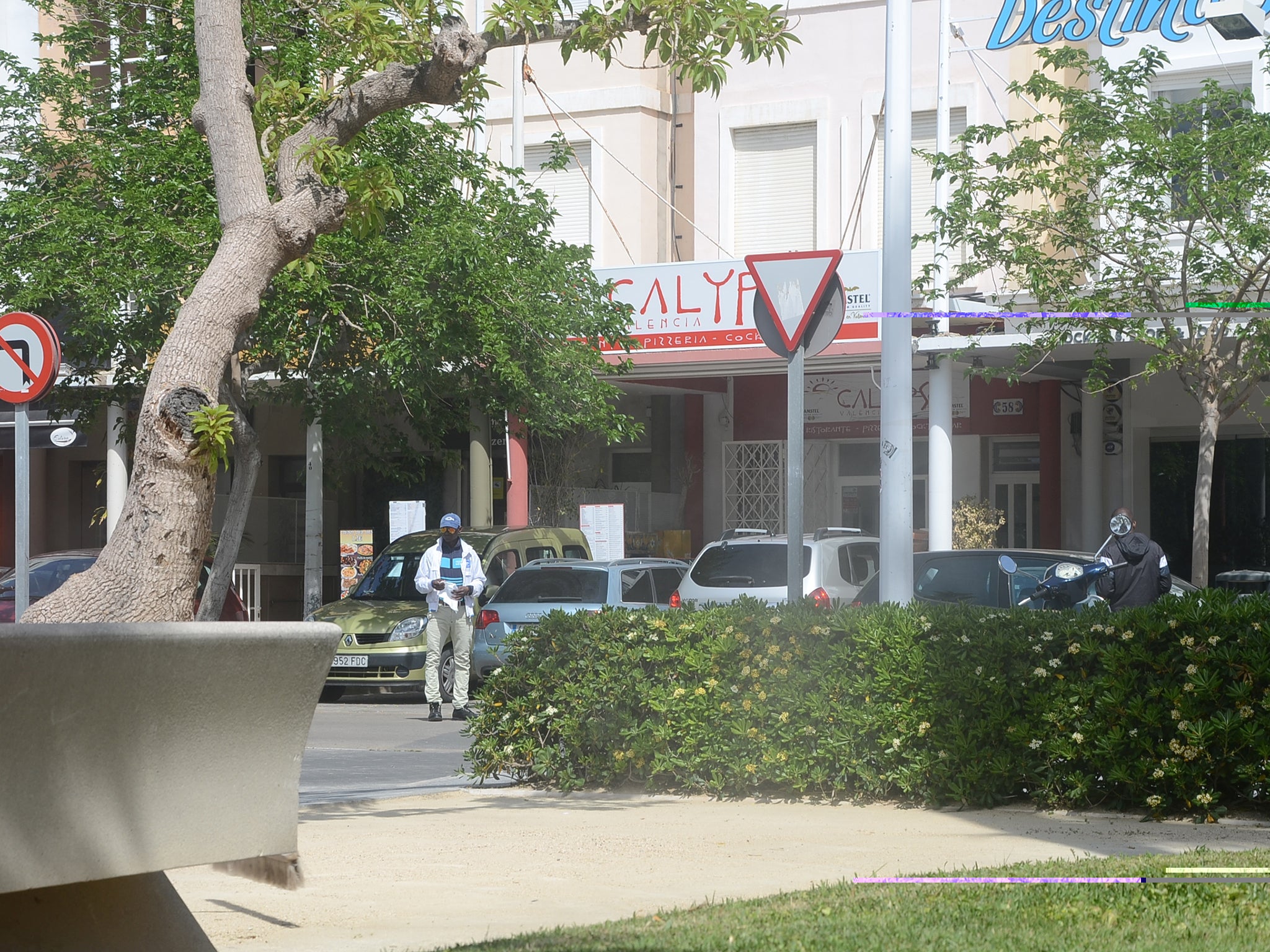
“I speak English, Spanish, French and Italian,” he told me once, and proceeded to provide samples in case I didn’t believe him. He then invited me to his home. “I want to show you where I live,” he said. “Many cats live with me,” he added, in order to encourage me to visit, knowing me primarily as the chap who turns up from time to time to feed the strays. He squats with others (human and feline) in a semi-derelict house close to the park. It is a prime piece of real estate, and I wonder how long it will be before plans are hatched for the land and he and his down-and-out housemates are evicted, turfed out onto the street to an even more uncertain future.
Noisy neighbours
Today, the smell of burning is in the breeze, and the sounds of explosions ripple around the park; it feels like all hell has broken loose. The cats are in a state of panic. Skippy is hiding under a parked car and Princesa is nowhere to be seen. In Valencia it is the time of Las Fallas, a festival during which people and children wander the streets letting off firecrackers. No corner or alleyway is safe. Unsuspecting pedestrians frequently get the life scared out of them by harmless but noisy explosions at their feet.

The Falles festival runs for five days in mid-March. It’s a major event on Valencia’s calendar. Each neighbourhood holds its own version, complete with street parties, live music, costume-wearing dancers, firework displays, and enormous cartoonish sculptures made of wood and papier-mache that get set alight on the last day of the festival. It’s a feast for the eyes, but an assault on the ears. And for the park’s strays, and for other street cats, it’s a week of terror.
The cats’ champion
Sabrina, a young lady in her mid-twenties, is one of the strays’ caregivers. She works in the same restaurant as Pepe. The first time I saw her she was throwing small fish to the cats, causing a feline feeding frenzy. I watched as they gleefully grabbed sardines between their teeth and headed to the seclusion of the nearest hedgerow to devour the delicacy in peace.
Sabrina is tall and athletic, with long black hair. The briefest of conversations is enough to reveal that she is smart and personable. And in a country almost as monolingual as the UK, she speaks excellent English. The fact that she works as a kitchen porter and doesn’t earn enough to be able to afford a computer speaks to the country’s economic malaise, which has hit young people the hardest (youth unemployment rates in Spain have been around the 40 per cent mark for over a decade). Under normal circumstances, and in most other developed European economies, being bright, young, likeable, attractive and bilingual would open doors and present employment opportunities. That said, the cats benefit greatly from having this kindly woman around, looking after them, bringing them tasty leftovers from her restaurant.
A territorial dispute
It’s a bright afternoon in early spring, the first really hot day of the year. The temperature is in the low twenties, and the sun is strong. Suddenly tempers fray and voices are raised. On the street adjacent to the park Saul is squaring up to one of the other parking attendants. There is posturing, shouting, aggressive gesticulation … and then a backing off. Friends and associates of both men are trying to defuse the situation. It looks like it’s over; then it’s on again. Saul removes his large gold-rimmed aviator sunglasses and places them on the bonnet of a parked car. There is a coming together, and a flurry of flailing limbs. Punches are thrown, but none, it seems, connect. And as quickly as it started, it is over. Friends separate the two combatants, who seem more than ready to be parted. Neither wants the fight to continue. You can see it in their eyes: stop now; nobody is hurt; honour is preserved. The posturing continues, of course, but now there are many bodies between the duellists.
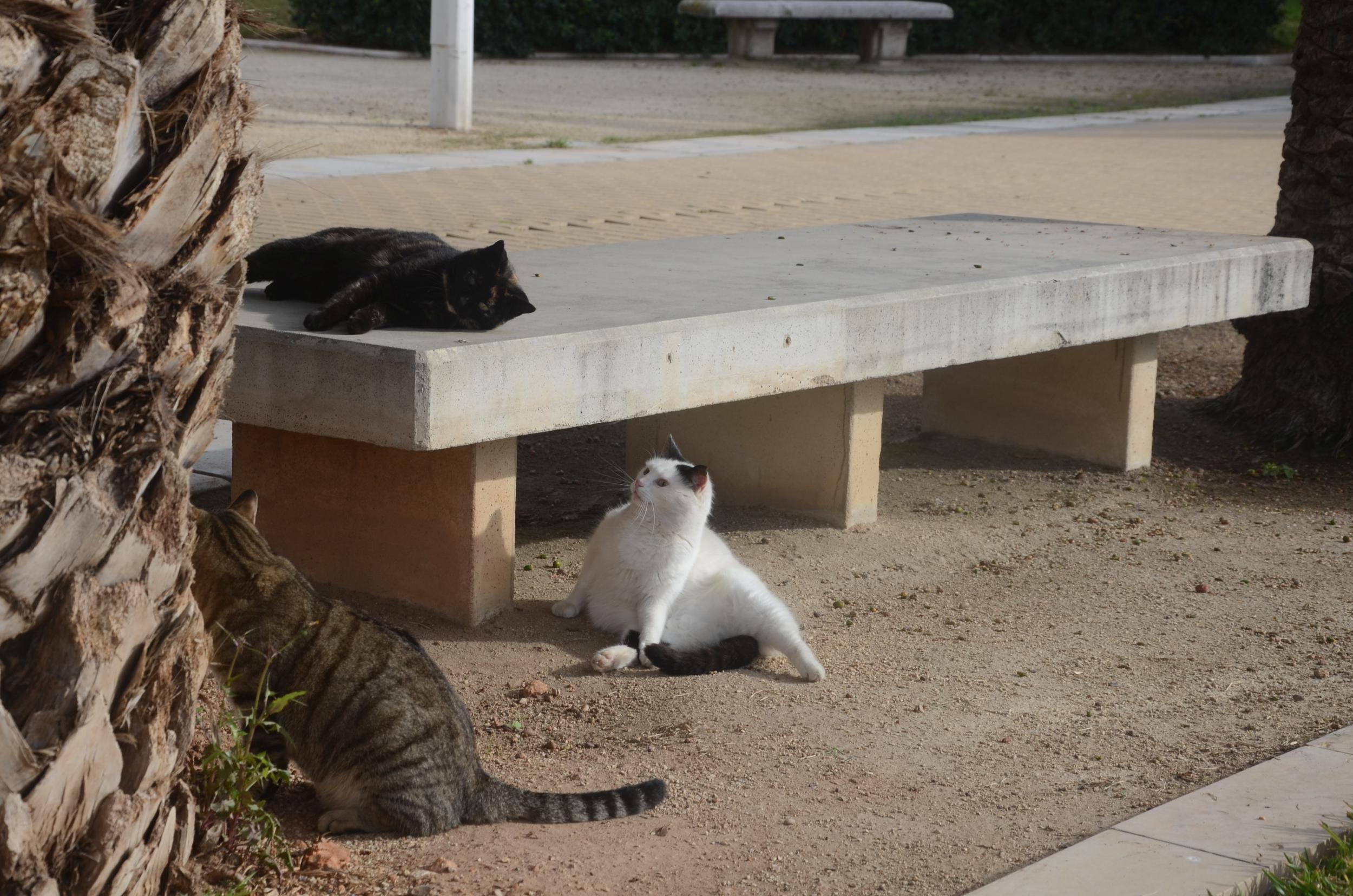
The cats are on edge, too. The sudden commotion has shaken them from their siestas. They watch – ears back, muscles tense – from hedgerows and from beneath parked cars. Gradually, calm is restored and the two men return to their respective territories.
A return after a long absence
It’s been over a year since I was last in the park. I walk up and down it a couple of times. I encounter no cats. I go to the restaurant where Pepe works. He tells me there are fewer strays around these days, and that Princesa is missing. She’s been gone a while. However, Skippy is still around… but has got fat, he says. But she was already fat, I say. Pepe laughs. “Now she is really, really fat.”
I’m sad to hear Princesa is missing, but Pepe thinks her disappearance isn’t sinister. He believes she may have been adopted. I hope so. But the absentee list doesn’t end there: the park has also lost another stalwart, though this one has only two legs. Sabrina’s gone… gone to India, for work. Another bright young Spaniard has left the country due to lack of opportunity.
Eventually, Skippy shows up and recognises me straightaway. But I almost don’t recognise her. Pepe is right. She has piled on the weight. I half wonder if she has a medical condition. And she looks much older now.
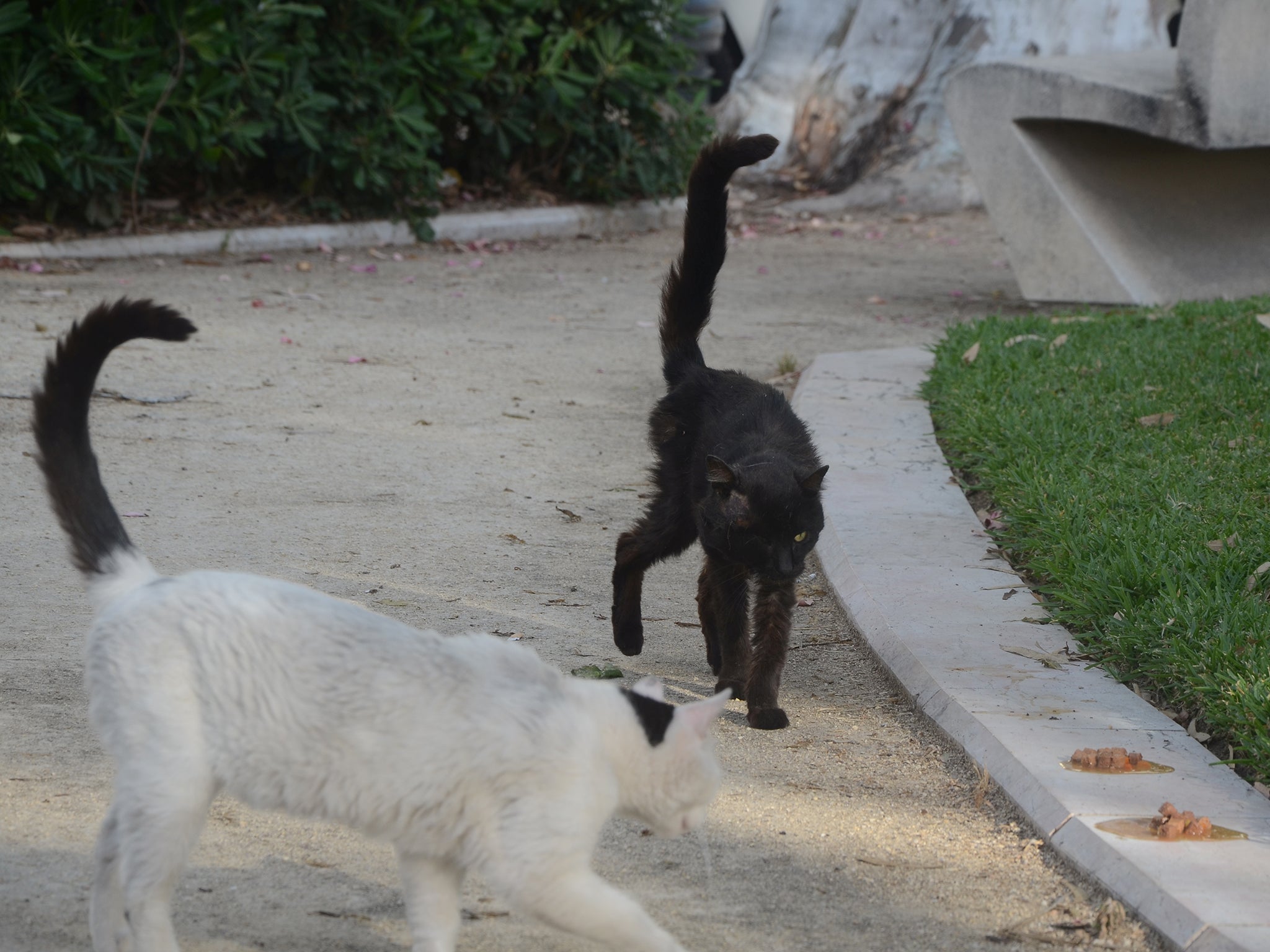
Over the next few weeks, I search for Roberto, but it seems he has moved on. Nobody’s seen him for ages. It is not unusual for Roberto to be gone for long periods, but this absence is longer than usual, with most park regulars unable to remember exactly when they last saw him; 18 months ago is the best guess. It’s a pity, as I had planned to photograph him and get more of his backstory during this visit. But a part of me is glad: he couldn’t go on sleeping rough in a park. It’s my hope that he’s got somewhere more permanent to live now. Like the cat at the end of Truman Capote’s Breakfast At Tiffany’s, perhaps he’s found a home. One day I’ll be walking down a Spanish street and I’ll spot him, “flanked by potted plants and framed by clean lace curtains”, through the window of a nice house. He’ll be sober, in freshly washed clothes, his stomach full, and I’ll know he too has arrived somewhere he belongs.
Dark skies and empty streets
It is mid-March 2020. The park is empty, and a sense of foreboding hangs in the air. The sky is unusually gloomy for this time of year, and rain has been coming down, on and off, for days. The city is in lockdown. People are not allowed to leave their homes unless they are going to the supermarket, pharmacy, hospital, or a job deemed essential. This year’s Falles have been cancelled. Coronavirus has hit Spain, and hit it hard. Currently, only Italy has worse numbers within Europe. Madrid has declared a state of emergency.
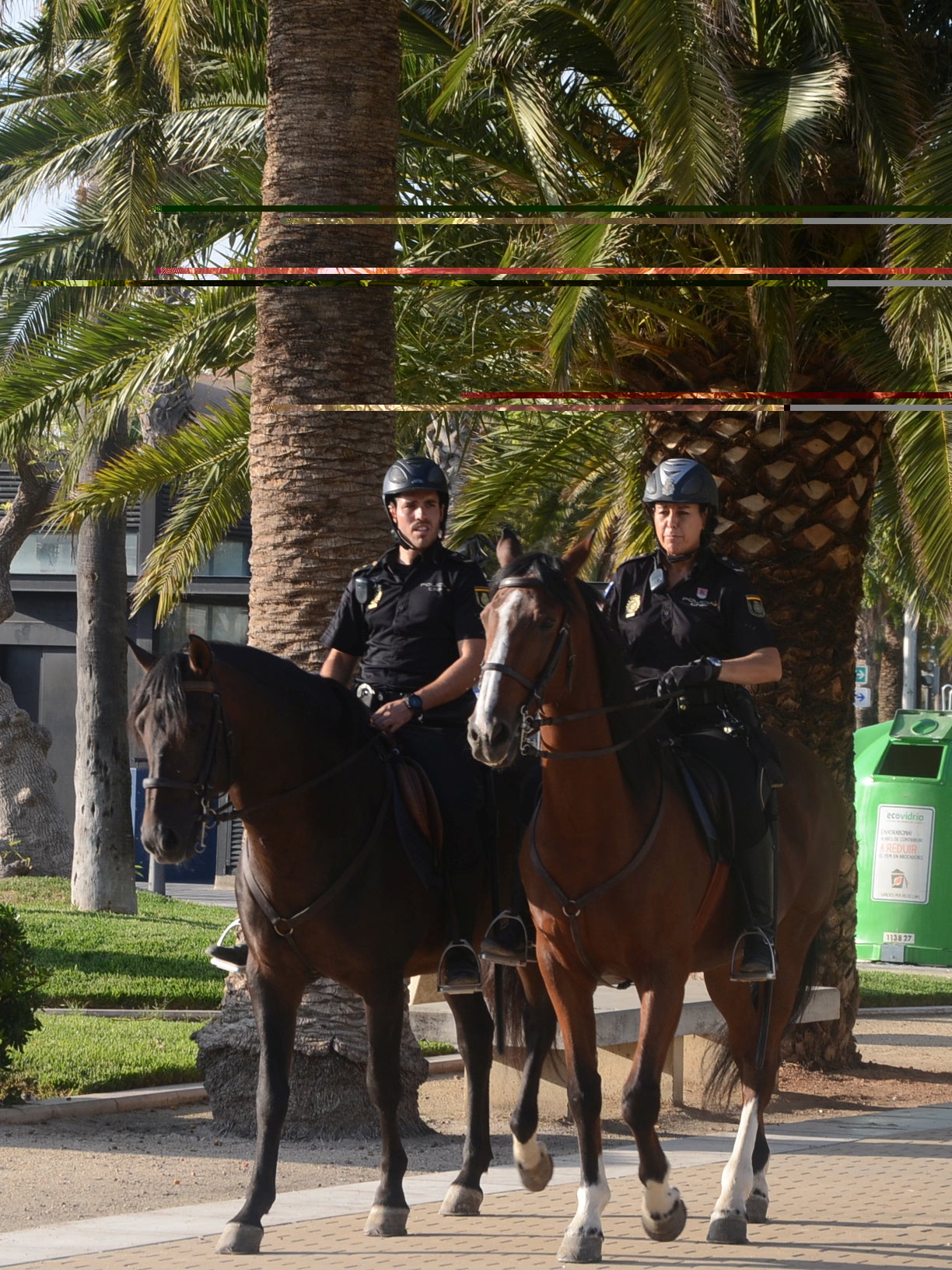
A man walks through the park with his dog. He walks briskly, the small dog struggling to keep up. We make eye contact, briefly. There is some sort of unspoken communication between us, a look, an expression, a shared sense of anxiety or exasperation. And in a flash, he’s gone, no doubt keen to get back to his home as soon as possible. I turn my attention to the cats. Skippy meows at me. She is hungry. Restaurants have been ordered to close, so there is no leftover food, and nobody to dole it out. This is unchartered territory for everyone: citizens, governments, restaurateurs, felines. I leave some food for the strays before heading home, fearful that if I loiter for too long the police will appear and fine me for defying the stay-at-home order. The cats sense something is wrong.
The aftermath
The lockdown is over. Non-essential shops, bars and restaurants are reopening, and people can again go out freely, though social distancing and mask-wearing remain compulsory. But the pandemic has left its mark on the park. Skippy is missing. I’ve searched all her spots and she is nowhere to be found. In fact, I have not seen any cats at all. Food must have been scarce whilst everyone was confined to their homes, and restaurants were shuttered. Saul is absent, too. It is likely that he was without any income for the last few months, and ineligible for state support. The abandoned house that was his home is boarded up and a sign has been erected declaring that the plot is to be redeveloped. Someone else has Saul’s section of the road adjacent to the park. I watch the new incumbent direct a car to a parking space and receive payment from the driver. And although some of the restaurants that back onto the gardens are once again open for business, Pepe’s is not.
I’ve been coming to this park intermittently for several years, and during that time there have been some constants, faces that I could expect to see on every visit. But many of those faces are no longer around. The bald-headed man that was a regular presence in the park, always taking the same bench for his siesta, and the short, curly-haired woman who I often saw begging outside supermarkets, both seem to have found somewhere else to while away the afternoons (or have found jobs, though that seems unlikely given the current circumstances). Before that, Tuerta disappeared, then Princesa. Sabrina left for pastures new and Roberto vanished. And now Skippy, Saul and Pepe have all gone – victims of a virus that one day swept in and turned their worlds upside down.
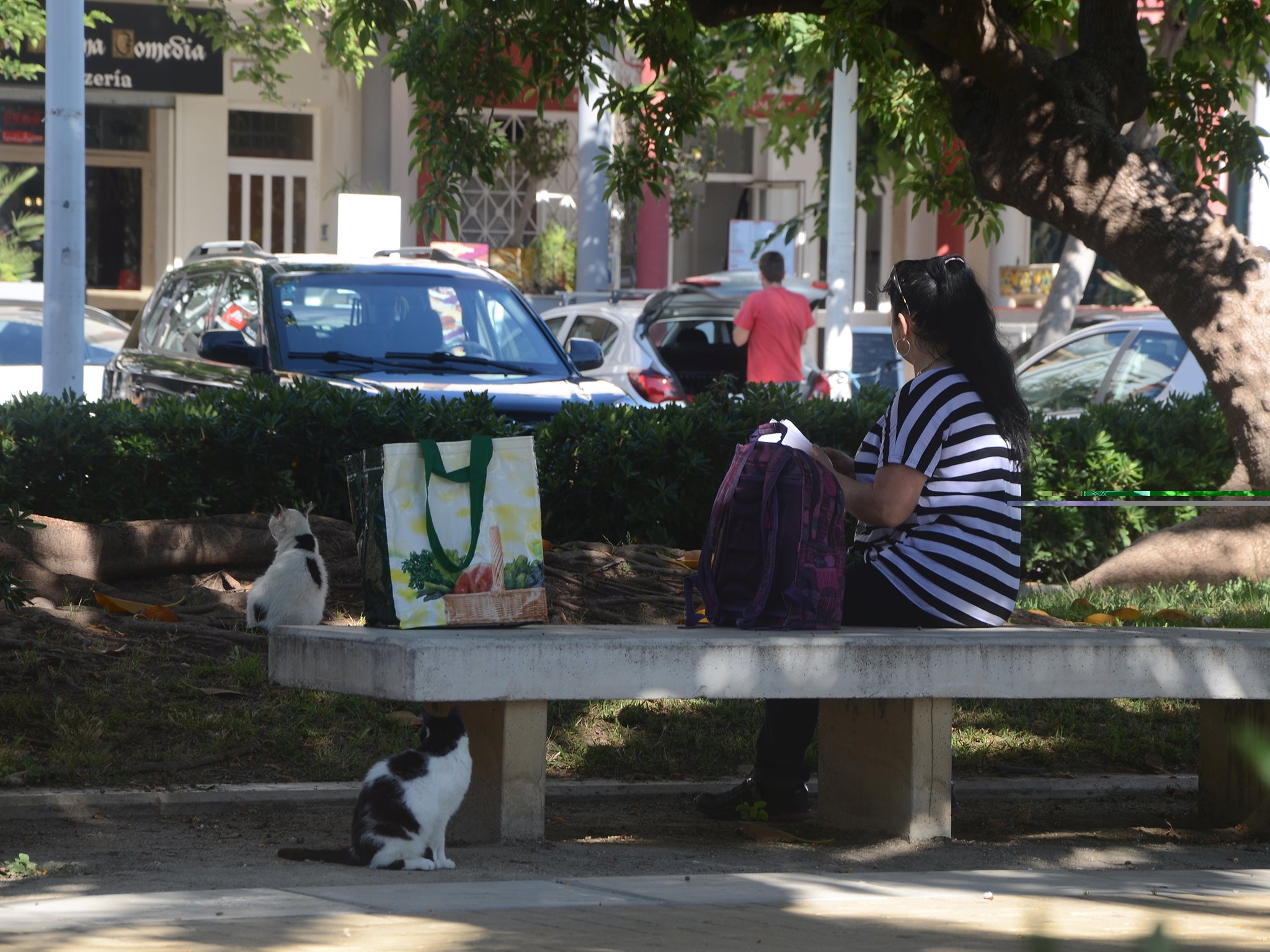
I bump into Maria. She is a sturdy, raven-haired, middle-aged woman, and the strays’ longest-serving caregiver. She turns up in the park once or twice a fortnight with a large tote bag filled with cat food. She changes the water in the plastic bowls she leaves out for them and tops up their store of hard food. She does this at a number of locations in the city, looking after several colonies. Without Maria, life for many of Valencia’s street cats would be much harder.
We chat at a safe distance. “Where have all the cats gone?” I ask. She thinks there are only two, maybe three, left in the park. “Have you seen Skippy?” She hasn’t. I also ask about Princesa. She knows what happened to her. And it is not good news. A while back, Maria saw that she was constantly vomiting, and took her to a vet. The diagnosis was bad and she was euthanised. It is sad news, but I reflect that Princesa had good innings, especially considering she was a stray, many of whom have short lifespans. Her home was a beautiful green space, and she lived free and easy. How many of us can say that of ourselves? And she lives on, in camera memory cards and on computer hard drives, a photo on a smartphone, a screensaver somewhere, an image of her among someone’s holiday snaps. Every time I start up my PC, I’m still greeted by her pretty face.
Epilogue
Skippy is alive! Moreover, she’s lost some weight and looks healthier for it. During the lockdown, she had to survive purely on the hard food Maria leaves out. Gone were the fatty restaurant leftovers. I found her sleeping beneath a parked car, and she was very nonchalant about everything. She looked at me quizzically when I asked her repeatedly where she had been for the past few weeks.
Saul is back too. He’s found a new place to live – a rundown building even closer to the park than his last squat – and has returned. He’s reclaimed his patch of street and is striding up and down it, shirtless, wearing only shorts, sandals and his trademark aviators, and grinning broadly. He is a slightly built chap, but with his shirt off he looks like a flyweight boxer: he is toned, and there isn’t an ounce of fat on him. A dark blue police van moves slowly along the street. It stops halfway down, and then reverses back up. Four policemen get out and approach Saul. He isn’t wearing a mask. Words are exchanged. The Guinean points to a nearby tree where his T-shirt and a mask are hanging. It is a scorching July day, and wearing a face covering when out in the sun is hot work. I’ve been taking mine off whenever I’m outside and able to keep my distance, otherwise I overheat. Saul is thoroughly reprimanded and reminded of his responsibilities. He puts on his mask and the officers return to their van and drive off. Many times before the lockdown, I saw the police have words with Saul. Plus ca change…
Pepe’s restaurant is still closed, but most of the neighbouring ones have now reopened. I feel it is only a matter of time before I see the big man again, walking his little dog through the park and leaving out food for the cats. And I suspect that the number of felines living in the park will soon increase, as the restaurant trade revives, and the flow of food from kitchens to cats is re-established. Slowly, things seem to be returning to normal. A new normal of course, and there may yet be setbacks to come, but little by little, people are reclaiming pieces of their pre-pandemic lives. I look across the park and see several benches occupied, and someone is riding a bicycle along its central walkway. Life is returning to Jardines de Neptuno, and tentatively we are returning to our lives.
Join our commenting forum
Join thought-provoking conversations, follow other Independent readers and see their replies
Comments